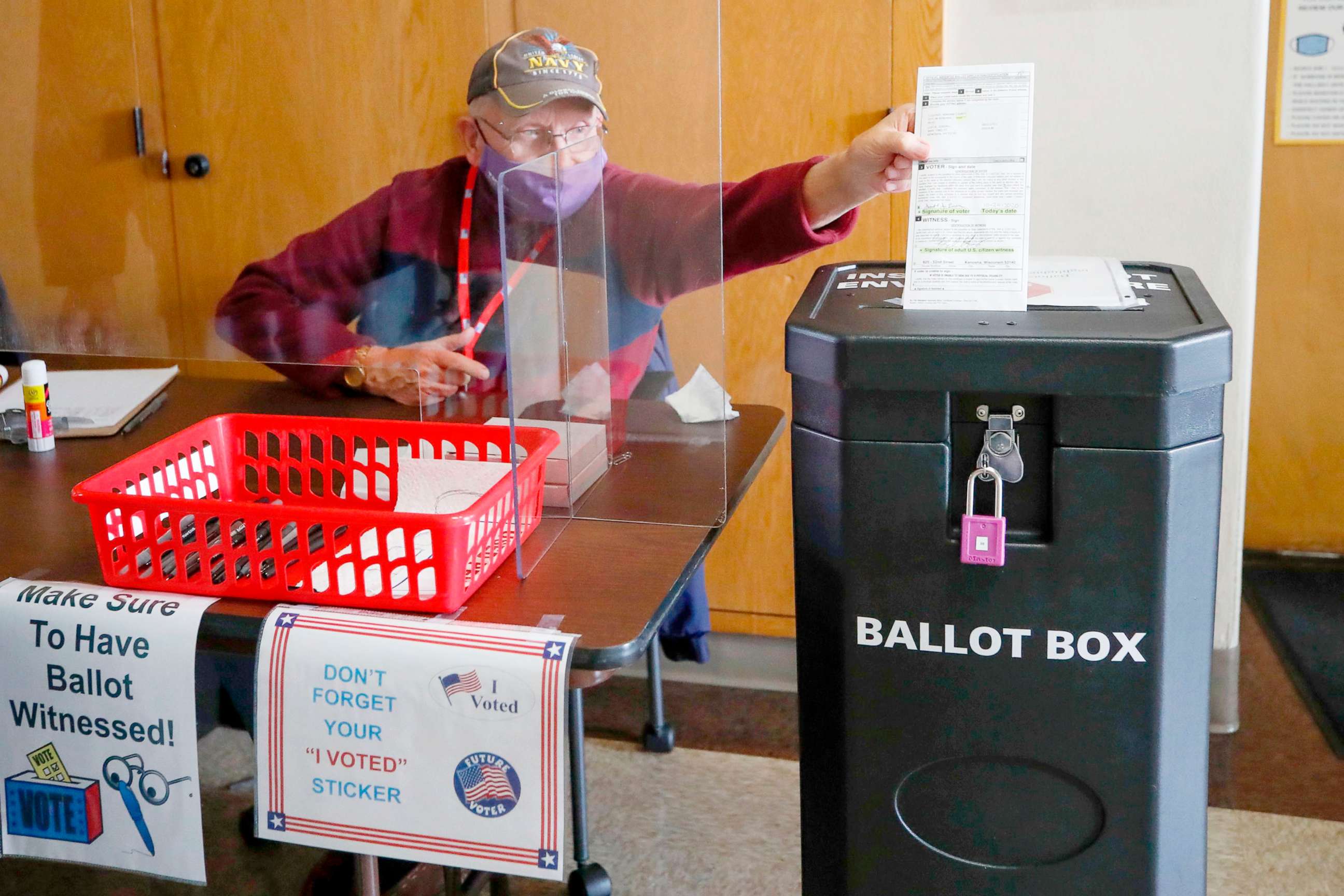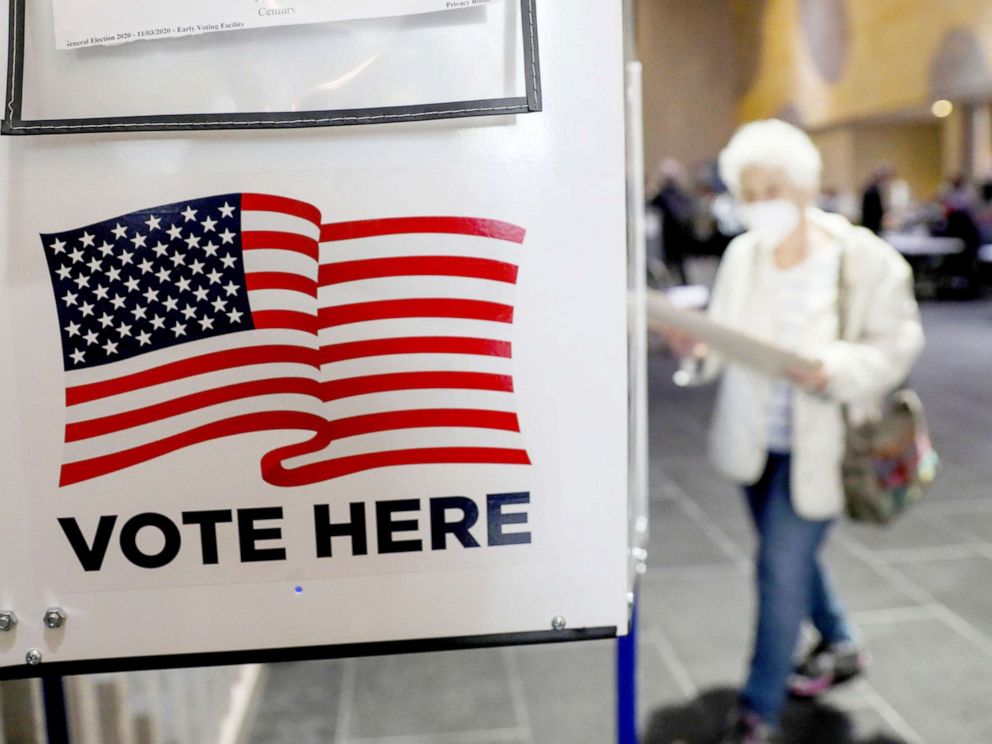'Don't wait': Some swing state officials urge voters to bypass the mail to return ballots
Nearly 3 million absentee ballots are still outstanding in key Rust Belt states.
With less than a week until Election Day and millions of absentee ballots still outstanding, state election officials in at least six in critical swing states are revising their message for voters, now urging them to bypass the Postal Service and instead vote in person or hand-deliver their ballots to ensure they are delivered in time to be counted.
Officials in Michigan, Pennsylvania, Florida, Wisconsin, Georgia and Ohio have all put out calls in recent days warning voters about potential postal delays, encouraging voters to use drop boxes or deliver ballots by hand.
"It's now important to return your ballots in person. Don't rely on the mail," Michigan Secretary of State Jocelyn Benson told ABC News Live Prime Anchor Linsey Davis on Tuesday.
Benson said the state is still waiting on more than 1 million absentee ballots to be returned.
Mail-in voting is expected to be at unprecedented levels this election cycle due to the health concerns of the novel coronavirus pandemic. But of the 88 million ballots voters requested, only half have been returned so far.
The last-minute push to bypass the Postal Service comes after months of concern from critics about the reliability of the mail in the electoral process, budgetary concerns with the agency and threats to cut services in a presidential election year -- fears that postal officials said were misguided. This summer, though, the post office warned state election officials that voters should send in their ballots no later than Oct. 27th in order to get them in on time in accordance with delivery standards.
The move also comes amid a background of litigation over extending mail-in ballot deadlines past Election Day, which Democrats generally favor and a push by Republicans and the Trump administration to end the process on Nov. 3.
With deadlines fast approaching, nearly every state allows voters who have requested absentee ballots to change their mind and vote in person, though the process varies from state to state. According to The US Vote Foundation, in 15 states, voters who change their mind (requested an absentee ballot but now want to vote in person) will have to bring in their absentee ballot to the polling place and “surrender” it.

'Find other options'
Nearly 3 million requested ballots have yet to be returned in the key Rust Belt battleground states of Michigan, Pennsylvania and Wisconsin, according to data compiled by the U.S. Elections Project. Those states were long-regarded to be part of a Democratic Party "blue wall," but they narrowly swung to President Trump in 2016. That year in Michigan, just over 10,000 votes tilted the state in his favor.
Trump won Wisconsin by about 22,000 votes in 2016. Now there are more than 300,000 ballots still outstanding, and the chief elections official there warned voters they are now up against the Postal Service's "practical" one-week deadline for voters to return absentee ballots.
"Your ballot must arrive by Election Day to be counted and the US Postal Service says it can take up to seven days for a letter to arrive, so if you're planning to mail your ballot back, you should mail it back as soon as possible," said Meagan Wolfe, administrator for the Wisconsin Elections Commission, said Tuesday. The U.S. Supreme Court declined to reinstate a lower court ruling that would have extended the mail-in ballot deadline six days.
After Tuesday, she advised, voters should "find other options" for returning their ballots to ensure they arrive by 8 p.m. on Nov. 3, such as returning them by hand to their local clerk's offices or placing them in a secure ballot drop box.
In Pennsylvania, Democratic Gov. Tom Wolfe strongly urged voters to immediately turn in their ballots to their local election clerk, keenly aware that the state remains embroiled in a legal battle over vote-by-mail deadlines. Ballots in the state must be post marked by election day and arrive within three days after the election.
"If you haven't already, voters with mail ballots should immediately hand-deliver your ballot to your county-designated location," he said. "Don't wait until Election Day. Hand-delivering your own ballot now will give you the peace of mind that your vote will be counted, and your voice will be heard in this historic election."
Both campaigns are viewing Pennsylvania as a pivotal electoral prize in the presidential contest. Trump won the state by just 44,000 votes in 2016, a tiny fraction of the more than 6 million votes cast.
In Florida, another state that both campaigns believe could help provide a pathway to victory, local officials are alerting voters to leave themselves extra time to return ballots. Kaiti Lenhart, Flagler County Supervisor of Elections, told a local CBS affiliate in Orlando, she considered Tuesday, Oct. 27 the last day voters could reliably return a ballot by mail. Officially, ballots in the state must arrive by 7 p.m. on Election Day.
In Ohio, an elections official in Cuyahoga County this week warned voters who waited until the Oct. 31 deadline to request an absentee ballots would be "testing the system" and may not have time to return those in the mail.
"If you are someone who's going to do that, I think you realistically need to be prepared to drive your ballot down here on Election Day because you may not get it till Election Day," said Tony Perlatti, the Cuyahoga County Board of Elections director. "And if you're not willing to do that, you may run into some challenges there."

Ballot deadlines uncertain in some cases
The renewed calls for urgency also come as Democrats and Republicans have multiple lawsuits pending over mail-in-ballot receipt deadlines. Uncertainty about the fate of those legal fights has only complicated matters, election officials said, especially as they have sought to educate voters on the mostly unfamiliar patchwork of rules that differ in each state.
Litigation to extend the deadlines for mail-in ballots to arrive has wound through the courts as Democrats have pushed to give voters more time and Republicans have sought to enforce strict Election Day deadlines.
Courts in Pennsylvania and North Carolina have upheld the deadline extensions, while in Georgia, Wisconsin and Michigan proposed extensions were struck down. The U.S. Supreme Court has declined to overturn rulings in Pennsylvania and Wisconsin, but the justices have not ruled out the possibility of weighing in on the question in coming days and weeks.
The challenge election officials face in effectively communicating new or unfamiliar rules for voting by mail has also been compounded by concerns about the reliability of timely mail delivery across the country.
Mail data provided to Congress last week by the U.S. Postal Service indicates that on-time delivery for first class mail -- which includes all election mail -- remains well below standards in place prior to a controversial overhaul of the agency enacted earlier this year by Postmaster General Louis DeJoy. After DeJoy put in place a series of cost-cutting measures over the summer, first-class mail performance plummeted to 81.5% in August, according to the report.
"It is unacceptable that on-time mail delivery has not been restored to levels prior to the Postmaster General carelessly instituting his disastrous operational changes," said Michigan Sen. Gary Peters, the ranking Democrat on the Senate Committee on Homeland Security and Governmental Affairs.
The Postal Service has consistently maintained that it is committed to delivering election mail on time, but in a letter to lawmakers in August, DeJoy acknowledged that his reforms had led to some "unintended consequences."
In September, DeJoy apologized to state leaders after the Postal Service distributed postcards encouraging voters to return mail-in ballots at least one week before Election Day. Various state leaders accused DeJoy of sowing confusion for voters in states where mail-in ballots could be returned closer to Nov. 3.
In a statement to ABC News on Tuesday, a Postal Service spokesperson encouraged voters to familiarize themselves with their own states’ deadlines, and again suggested returning completed ballots at least one week prior to those deadlines.
“Some states may recommend allowing even more time for mailing completed ballots,” said David Partenheimer, the Postal Service spokesperson. “Voters should keep these recommendations in mind when deciding how to return their ballots.”
'Now's the time'
Over the years, there is a long record of ballots being rejected for arriving late, according elections experts speaking to FiveThirtyEight. And an ABC News analysis found that to be one of the primary reasons absentee ballots were rejected in the 2016 and 2018 elections.
Now, voting rights activists say the risks are even higher that forces beyond a voter's control could lead to their disenfranchisement.
"There is no telling how many that could be but it may be tens of thousands of ballots will come in late and not be counted even if they were mailed and postmarked before or on Nov. 3," Jay Heck, the Wisconsin executive director of Common Cause, a nonpartisan organization dedicated to protecting and improving voters' rights and access to the ballot, told ABC News.
In Georgia, where late-arriving ballots were the most common reason for ballot rejections in the primary, according to the Atlanta Journal-Constitution, the secretary of state, a Republican, is also raising similar alarm bells.
"If you are one of those 640,000 voters who have an absentee ballot -- it's sitting on your kitchen table -- please, if you haven't returned it, do it this week. Now's the time," he said. Ballots are due by 7 p.m. on Nov. 3.
The Democratic Party of Georgia is urging the same -- noting that the state is going to "come down to the wire" and every vote will be critical.
The party "strongly recommends" that voters should now avoid the post office and hand deliver their ballots to a drop box or clerk's office in order "to make sure they get their ballot counted," Maggie Chambers, the party's communications director, told ABC News on Tuesday.
ABC News' Luke Barr and Soorin Kim contributed to this report.





